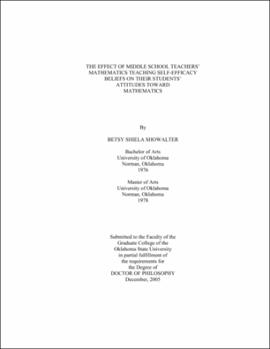| dc.contributor.advisor | Lamphere-Jordan, Patricia | |
| dc.contributor.author | Showalter, Betsy Shiela | |
| dc.date.accessioned | 2013-11-26T08:34:53Z | |
| dc.date.available | 2013-11-26T08:34:53Z | |
| dc.date.issued | 2005-12 | |
| dc.identifier.uri | https://hdl.handle.net/11244/7571 | |
| dc.description.abstract | Scope and Method of Study: One purpose of this study was to determine if there was a relationship between middle school mathematics teachers' teaching self-efficacy beliefs and their students' attitudes toward mathematics. A second area of interest was to find out what aspect of a middle school student's attitude toward mathematics affected his or her plans to enroll in mathematics courses beyond those required for graduation. Participants in this study were eight middle school mathematics teachers and the students in one of each of their classes. The teachers completed the Mathematics Teaching Efficacy Beliefs Instrument (MTEBI) and a questionnaire and were interviewed by the researcher. The students completed three of the Fennema-Sherman Mathematics Attitudes Scales (F-S MAS) and a questionnaire and two students from each class were interviewed by the researcher. Pearson's r was used to determine the significance of the relationship between mathematics teaching self-efficacy beliefs and attitude toward mathematics. | |
| dc.description.abstract | Findings and Conclusions: No significant relationship was found between a teacher's mathematics teaching self-efficacy beliefs and his or her students' attitudes toward mathematics. However, the Pearson's r of .596 indicated that there was a relationship between a student's attitude toward his or her teacher and his or her confidence about learning mathematics and the Pearson's r of .533 indicated that there was a relationship between a student's attitude toward his or her teacher and his or her perception of the usefulness of mathematics. Therefore, the teacher exerts a strong influence on how a student views mathematics. Data from the questionnaires and interviews further supports the conclusion that the teacher is influential in how a student views mathematics. Results from the qualitative data also indicates that middle school students are already thinking about careers and that at least half of them view knowledge of mathematics as being important to their preparations for a future career. The students credited their teachers with emphasizing the importance of mathematics. | |
| dc.format | application/pdf | |
| dc.language | en_US | |
| dc.rights | Copyright is held by the author who has granted the Oklahoma State University Library the non-exclusive right to share this material in its institutional repository. Contact Digital Library Services at lib-dls@okstate.edu or 405-744-9161 for the permission policy on the use, reproduction or distribution of this material. | |
| dc.title | Effect of middle school teachers' mathematics teaching self-efficacy beliefs on their students' attitudes toward mathematics | |
| dc.contributor.committeeMember | Scott, Margaret M. | |
| dc.contributor.committeeMember | Bertholf, Dennis | |
| dc.contributor.committeeMember | Beller, Caroline | |
| osu.filename | Showalter_okstate_0664D_1568 | |
| osu.accesstype | Open Access | |
| dc.type.genre | Dissertation | |
| dc.type.material | Text | |
| thesis.degree.discipline | Teaching and Curriculum Leadership | |
| thesis.degree.grantor | Oklahoma State University | |
